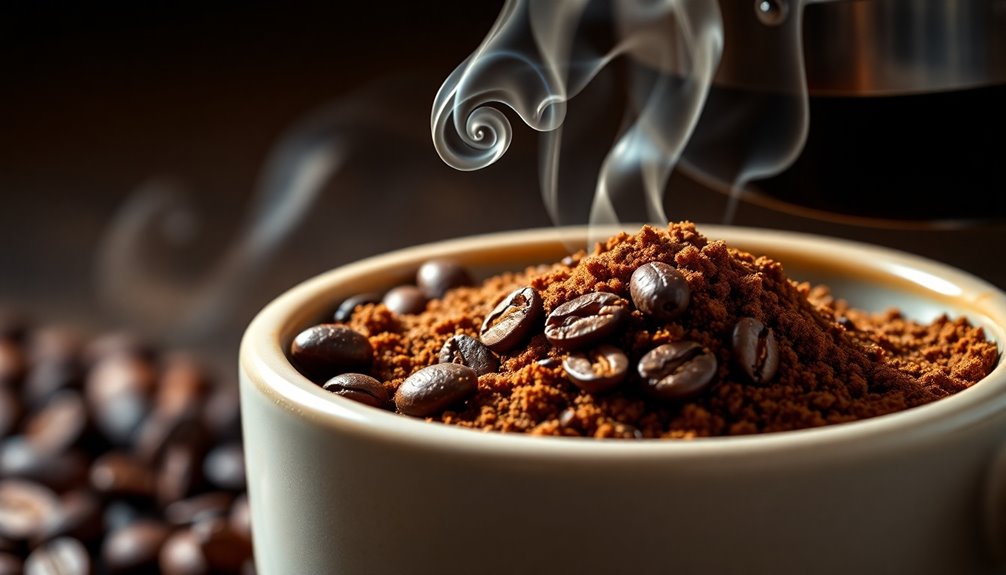The art of freshly ground coffee elevates your brewing experience, revealing flavors that pre-ground coffee just can't match. When you grind your beans, you enhance aroma and boost the richness of natural oils. Remember, oxidation sets in quickly after grinding, so brew immediately for the best taste. Your grind size matters too; finer grounds extract flavor faster, while coarser ones need longer to develop. Using the right tools and fresh ingredients can lead to an unforgettable cup. Want to unlock even more secrets behind that perfect brew? Stay tuned for tips on maximizing your coffee's flavor!
Key Takeaways
- Freshly ground coffee preserves natural oils and enhances flavor and aroma, offering a richer tasting experience.
- Grind size significantly impacts extraction; use finer grounds for espresso and coarser for French press to optimize flavor.
- Oxidation rapidly diminishes coffee quality; brew immediately after grinding to enjoy the full range of flavors.
- Store beans in airtight containers to protect against oxidation and maintain freshness for 2-4 weeks post-roasting.
- Using a burr grinder ensures consistent grind size, essential for achieving the best flavor in your coffee.
Importance of Freshly Ground Coffee

When you brew a cup of coffee, the importance of using freshly ground beans can't be overstated. Freshly ground coffee not only maintains better consistency but also enhances overall quality. The increased surface area helps preserve the natural oils, vital for a great taste. Furthermore, the flavor and aroma are significantly improved when using freshly ground coffee.
In contrast, pre-ground coffee loses those oils quickly due to oxidation, diminishing flavor and aroma. That's why most coffee shops prioritize freshly ground beans. Additionally, coffee's health benefits are greater when it's freshly ground, as it contains fewer free radicals and is rich in antioxidants. By grinding your coffee just before brewing, you ensure that you're enjoying a delicious, fresh cup that supports your well-being and enhances your coffee experience.
Impact on Flavor and Aroma

Using freshly ground coffee not only enhances the brewing process but directly impacts the flavor and aroma of your cup.
The volatile compounds in coffee, responsible for its unique smell and taste, are sensitive to oxygen, heat, and light. When you grind your beans, you release these compounds, enriching your coffee's aromatic profile. However, this process also initiates oxidation, which can diminish flavor and aroma if not brewed immediately. Pre-ground coffee is particularly prone to oxidation, leading to a bland cup. Additionally, freshness impacts the balance of these components, enhancing the overall flavor experience. Proper storage in an airtight container away from heat and light helps preserve these precious compounds, ensuring your coffee remains vibrant and flavorful.
Enjoying freshly ground coffee means savoring every delightful note.
Role of Grind Size

Grind size plays a crucial role in how your coffee tastes and brews, impacting everything from flavor extraction to brewing time. Finer grounds have a greater surface area, allowing for quicker extraction of flavor compounds, while coarser grounds slow down the process. This means that if you're using a fine grind, your coffee will extract faster and need shorter contact time with water. Conversely, coarser grounds require longer to achieve full flavor. Each grind type has an ideal brewing method for optimal flavor, contributing to the overall extraction quality of your coffee. Additionally, the presence of antioxidants in freshly ground coffee can enhance its health benefits, making the flavor experience even more rewarding.
Different brewing methods also dictate grind size; espresso needs fine grounds, while French press calls for coarse. Adjusting grind size is essential for avoiding over- or under-extraction, as the right size influences water flow and overall flavor profile. Experiment to find what suits your taste best!
Effects of Oxidation

The flavor of freshly ground coffee can be severely impacted by oxidation, which occurs when oxygen interacts with coffee beans. This process breaks down complex molecules, affecting fats and aromatic compounds, causing a loss of freshness and flavor.
Over 800 flavor compounds are affected, resulting in stale, less vibrant tastes. Aromatic compounds, like sweet-smelling aldehydes, are released and then oxidize, leading to earthy and pungent aromas. Maintaining freshness is crucial for preserving the delightful flavors you love in your cup of coffee.
To minimize oxidation, use airtight containers and store your coffee in the shade. Ideally, enjoy your coffee within 7 to 21 days after roasting, and grind beans just before brewing.
Managing oxygen exposure and humidity is crucial for preserving the delightful flavors you love in your cup of coffee.
Techniques for Optimal Flavor

While achieving optimal flavor in your coffee can seem complex, focusing on key techniques makes a significant difference. Learning about the different brewing methods, such as pour-over or French press, can also enhance the flavor of your coffee. Additionally, understanding the coffee history of different regions and the influence of factors like altitude and soil can add depth to your appreciation of the beverage. By honing in on these essential elements, you can elevate your coffee experience and fully savor the rich flavors that each cup has to offer.
Start by using a burr grinder for a consistent grind size—avoid blade grinders, as they create uneven textures. Aim for a fine grind, but not too fine to prevent bitterness. Freshness is crucial; using beans within 2-4 weeks of roasting will enhance flavor.
Next, pay attention to your water temperature, keeping it between 195°F and 205°F for the best extraction. Use filtered or spring water to enhance flavor, steering clear of distilled options.
Experiment with brewing methods like pour-over or French press, maintaining the "Golden Ratio" of one to two tablespoons of coffee per six ounces of water.
Lastly, taste different coffees side by side to refine your palate and discover your favorite flavor profiles.
Frequently Asked Questions
How Long Should I Wait After Grinding Before Brewing Coffee?
You should wait a bit after grinding your coffee before brewing to enhance the flavor.
If your coffee was roasted 1 day ago, let it sit for at least 1 hour. For 2 days, wait about 15 minutes, and for 3 days, just 5 minutes.
Once it's over 4 days old, you can brew right away. This rest time helps the coffee degas, resulting in a smoother, more flavorful cup.
What Equipment Is Best for Grinding Coffee Beans?
If you're looking for the best equipment to grind coffee beans, consider investing in a burr grinder.
They provide consistent grind size, which is crucial for flavor extraction.
Choose between conical or flat burr grinders based on your noise preference and brewing method.
For precision, look for a grinder with multiple grind settings and an easy-to-use interface.
A well-chosen grinder can significantly enhance your coffee experience, making each cup more enjoyable.
Can I Freeze Freshly Ground Coffee for Later Use?
Yes, you can freeze freshly ground coffee for later use.
Just make sure you store it in an airtight container or vacuum-sealed bag to lock out moisture and odors.
Freeze it at around -18°C within 7-14 days of roasting for the best flavor preservation.
When you're ready to use it, let it thaw at room temperature for about an hour.
Avoid re-freezing and use it within a week for optimal taste.
How Do I Store Freshly Ground Coffee to Maintain Freshness?
To store freshly ground coffee and maintain its freshness, keep it in a cool, dark place away from sunlight and heat.
Use an airtight container made of glass, ceramic, or stainless steel to block out moisture and oxygen.
Avoid the fridge to prevent condensation.
If you're not using it right away, consider freezing it in a vacuum-sealed container, but let it reach room temperature before opening to preserve flavor.
Is There a Difference Between Blade and Burr Grinders?
Yes, there's a significant difference between blade and burr grinders.
Blade grinders chop beans unevenly, creating inconsistent grind sizes, which can lead to poor extraction and flavor.
On the other hand, burr grinders crush beans uniformly, allowing for precise control over grind size.
This consistency enhances extraction and preserves the coffee's flavor and aroma.
If you're serious about your brew, you'll want to invest in a burr grinder for the best results.
Conclusion
In the world of coffee, freshly ground beans are your ticket to a richer, more vibrant experience. By understanding the impact of grind size and the dangers of oxidation, you can unlock the full potential of your brew. Remember, each cup is an opportunity to savor those unique flavors and aromas. So, invest in a good grinder and make the effort—you'll taste the difference in every sip. Enjoy the journey of discovering your perfect cup!










